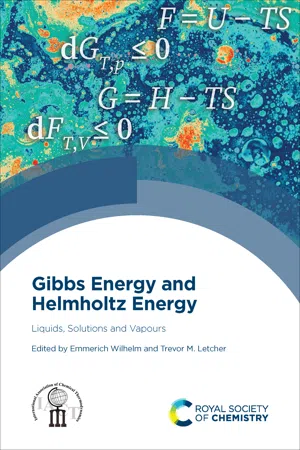
Gibbs Energy and Helmholtz Energy
Liquids, Solutions and Vapours
- 486 pages
- English
- ePUB (mobile friendly)
- Available on iOS & Android
Gibbs Energy and Helmholtz Energy
Liquids, Solutions and Vapours
About this book
This book contains the latest information on all aspects of the most important chemical thermodynamic properties of Gibbs energy and Helmholtz energy, as related to fluids. Both the Gibbs energy and Helmholtz energy are very important in the fields of thermodynamics and material properties as many other properties are obtained from the temperature or pressure dependence. Bringing all the information into one authoritative survey, the book is written by acknowledged world experts in their respective fields. Each of the chapters will cover theory, experimental methods and techniques and results for all types of liquids and vapours.
This book is the fourth in the series of Thermodynamic Properties related to liquids, solutions and vapours, edited by Emmerich Wilhelm and Trevor Letcher. The previous books were: Heat Capacities (2010), Volume Properties (2015), and Enthalpy (2017). This book fills the gap in fundamental thermodynamic properties and is the last in the series.
Frequently asked questions
- Essential is ideal for learners and professionals who enjoy exploring a wide range of subjects. Access the Essential Library with 800,000+ trusted titles and best-sellers across business, personal growth, and the humanities. Includes unlimited reading time and Standard Read Aloud voice.
- Complete: Perfect for advanced learners and researchers needing full, unrestricted access. Unlock 1.4M+ books across hundreds of subjects, including academic and specialized titles. The Complete Plan also includes advanced features like Premium Read Aloud and Research Assistant.
Please note we cannot support devices running on iOS 13 and Android 7 or earlier. Learn more about using the app.
Information
*E-mail: [email protected]
Thermodynamics is a science of bulk matter (solid, liquid, gaseous) presuming no detailed information on the microscopic structure of matter: it provides mathematical relations between macroscopic observable properties that are invariable to all changes in microscopic concepts. Thermodynamic theory is applicable to all types of macroscopic matter, irrespective of its chemical composition and independent of molecule-based information – this is the strength of thermodynamics and the basis of its enormous generality. Using an axiomatic approach, this chapter presents systematically and concisely essential parts of classical thermodynamics applicable to non-electrolyte fluids, pure and mixed. All fundamental property relations in the internal energy representation as well as in the entropy representation are derived via Legendre transformation. Residual properties in (T,P,x)-space, in (T,V,x)-space and in (T,ρ,x)-space are presented and their relations to fugacities and fugacity coefficients are established. In addition, property changes on mixing, excess properties and Lewis–Randall activity coefficients are discussed. Finally, several topics of current interest in molecular thermodynamics are considered, such as internal pressure, solubility parameter and equations of state.
1.1 Introduction
- The remarkable feature of thermodynamics is its independence from any microscopic assumptions: it provides us with mathematical relations between macroscopic properties that are invariable to all changes in microscopic molecular models. Thermodynamic theory is applicable to all types of macroscopic matter, irrespective of its chemical composition and independent of molecule-based information, i.e. systems are treated as “black boxes” and the concepts used ignore the existence of molecules and indeed do not need it: thermodynamic relations would correctly describe macroscopic reality if matter were continuous. Although thermodynamics alone does not provide any molecular information, this is not a disadvantage. Consider, for instance, (biological) systems that are too complicated to be adequately des...
Table of contents
- Cover
- Halftitle
- Title
- Copyright
- Foreword
- Preface
- Contents
- Chapter 1 Gibbs Energy and Helmholtz Energy: Introduction, Concepts and Selected Applications
- Chapter 2 Low-pressure Solubility of Gases in Liquids
- Chapter 3 Assembly of Hard Spheres in Liquid Water
- Chapter 4 Excess Molar Gibbs Energies: Related Properties and Formalisms Using DISQUAC
- Chapter 5 Simultaneous Determination of Equilibrium Constants, Enthalpy Changes and Stoichiometries by Titration Calorimetry
- Chapter 6 Solvation Free Energy by 3D-RISM-KH Theory
- Chapter 7 Calculation Itinerary to Check the Quality of Vapour–Liquid Equilibrium Data
- Chapter 8 Correlative and Predictive Models for GE
- Chapter 9 Gibbs Energies in Biomolecular Solutions
- Chapter 10 Solvation Gibbs Energy: The Equation of State Approach
- Chapter 11 Limiting Activity Coefficients: New Procedures, Computations and Measurements
- Chapter 12 Free Energy in Thermal and Chemical Protein Unfolding
- Chapter 13 The Statistical Associating Fluid Theory
- Chapter 14 Gibbs–Helmholtz Equation: Practical Applications in Thermochemistry
- Chapter 15 Experimental Determination of Vapor Pressures
- Chapter 16 Stability of Real Liquid Crystals
- Chapter 17 Thermodynamics of the Folding and Interconversion of G-quadruplex DNA Structures
- Subject Index